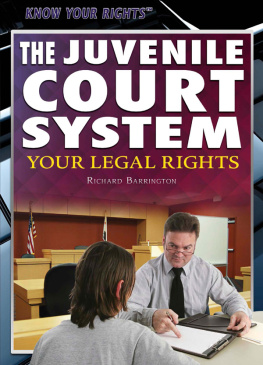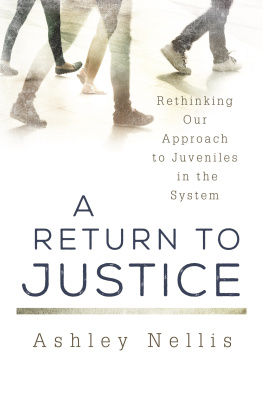THE EVOLUTION OF THE JUVENILE COURT
YOUTH, CRIME, AND JUSTICE SERIES
General Editors: Franklin E. Zimring and David S. Tanenhaus
Homeroom Security: School Discipline in an Age of Fear
Aaron Kupchik
Kids, Cops, and Confessions: Inside the Interrogation Room
Barry C. Feld
Choosing the Future for American Juvenile Justice
Edited by Franklin E. Zimring and David S. Tanenhaus
Juvenile Justice in Global Perspective
Edited by Franklin E. Zimring, Mximo Langer, and David S. Tanenhaus
The Evolution of the Juvenile Court: Race, Politics, and the Criminalizing of Juvenile Justice
Barry C. Feld
The Evolution of the Juvenile Court
Race, Politics, and the Criminalizing of Juvenile Justice
Barry C. Feld
NEW YORK UNIVERSITY PRESS
New York
NEW YORK UNIVERSITY PRESS
New York
www.nyupress.org
2017 by New York University
All rights reserved
References to Internet websites (URLs) were accurate at the time of writing. Neither the author nor New York University Press is responsible for URLs that may have expired or changed since the manuscript was prepared.
Library of Congress Cataloging-in-Publication Data
Names: Feld, Barry C., author.
Title: The evolution of the juvenile court : race, politics, and the criminalizing of juvenile justice / Barry C. Feld.
Other titles: Youth, crime, and justice series.
Description: New York : New York University Press, [2017] | Series: Youth, crime, and justice series | Also available as an ebook. | Includes bibliographical references and index.
Identifiers: LCCN 2017003870 | ISBN 978-1-4798-9569-4 (cl. ; alk. paper) | ISBN 1-4798-9569-5 (cl. ; alk. paper)
Subjects: LCSH: Juvenile courtsUnited StatesHistory. | Juvenile justice, Administration ofUnited StatesHistory. | Juvenile delinquencyUnited StatesHistory. | Discrimination in juvenile justice administrationUnited StatesHistory. | Sex discrimination in justice administrationUnited StatesHistory. | Juvenile delinquentsUnited States.
Classification: LCC KF 9794 . F 45 2017 | DDC 345.73/08109dc23
LC record available at https://lccn.loc.gov/2017003870
New York University Press books are printed on acid-free paper, and their binding materials are chosen for strength and durability. We strive to use environmentally responsible suppliers and materials to the greatest extent possible in publishing our books.
Manufactured in the United States of America
10 9 8 7 6 5 4 3 2 1
Also available as an ebook
For Patricia, love of my life
CONTENTS
ACKNOWLEDGMENTS
I received institutional and personal assistance from many people to write this book. For more than four decades, the University of Minnesota Law School has been my intellectual home, a marvelous place to work, and strongly supportive of scholarly endeavors. I cannot adequately describe my gratitude to Dean David Wippman for his help to me and encouragement of this project. Three research assistantsAlicia Paller, Class of 2015; Carolyn Isaac, Class of 2016; Nadia Anguiano-Wehde, Class of 2017provided exceptional help during the writing of this book and for which I am very grateful. The University of Minnesota Law School Library provides extraordinary backing for faculty. David Zopfi-Jordan and Connie Lenz retrieved resources with speed and efficiency. I am indebted to all these kind and generous people.
The Robina Institute of Criminal Law and Criminal Justice sponsored a conference at the University of Minnesota Law School in May 2016 to review an earlier draft of this book. I am grateful to its co-directors, Richard Frase and Kevin Reitz, for enabling this conclave. Richard Frase, Herbert Kritzer, Aaron Kupchik, Kate Kruse, Kelly Mitchell, Perry Moriearty, Ashley Nellis, Myron Orfield, Shelly Schaefer, Francis Shen, Michael Smith, David Tanenhaus, Michael Tonry, and Geoff Ward attended the conference, read the entire manuscript, provided detailed critiques, and suggested many ways to improve the book. Donna Bishop, Dan Mears, Simon Singer, and Franklin Zimring read the manuscript and provided additional guidance to help me find the through-line. Although I have tried to respond to their invaluable reviews, I alone am responsible for the final iteration of this book.
This book culminates several decades of research and writing about juvenile justice. I have published earlier versions of parts of several chapters in criminology journals, law reviews, books, and book chapters, although all have been substantially revised, rewritten, and changed beyond recognition. I am grateful to the following who have kindly allowed me to use my previous works: University of Minnesota Law Review for Criminalizing Juvenile Justice: Rules of Procedure for the Juvenile Court, 69 Minnesota Law Review 141 (1984); Boston University Law School for The Juvenile Court Meets the Principle of Offense, 68 Boston University Law Review 821 (1988); Oxford University Press for Bad Kids: Race and the Transformation of the Juvenile Court (1999); Wake Forest Law School for The Constitutional Tension between Apprendi and McKeiver : Sentence Enhancements Based on Delinquency Convictions and the Quality of Justice in Juvenile Courts, 38 Wake Forest Law Review 1111 (2003); University of Minnesota Law Review for Race, Politics, and Juvenile Justice: The Warren Court and the Conservative Backlash, 87 Minnesota Law Review 1447 (2003); Sage Publications for Violent Girls or Relabeled Status Offenders? An Alternative Interpretation of the Data, 55 Crime & Delinquency 241 (2009); University of Mississippi Law School for T.L.O. and Redding s Unanswered (Misanswered) Fourth Amendment Questions: Few Rights and Fewer Remedies, 80 Mississippi Law Journal 847 (2011); Oxford University Press for Procedural Rights in Juvenile Courts: Competence and Consequences, in Barry C. Feld and Donna Bishop, co-editors, Oxford Handbook on Juvenile Crime and Juvenile Justice (2012); Oxford University Press for Transfer of Juveniles to Criminal Court, in Barry C. Feld and Donna Bishop, co-editors, Oxford Handbook on Juvenile Crime and Juvenile Justice (2012); University of Minnesota Law School for Adolescent Criminal Responsibility, Proportionality, and Sentencing Policy: Roper , Graham , Miller/Jackson , and the Youth Discount, 31 Journal of Law & Inequality 263 (Spring 2013); Ohio State Law School for The Youth Discount: Old Enough to Do the Crime, Too Young to Do the Time, 11 Ohio State Journal of Criminal Law 107 (2014).
I have dedicated this book to my wife, Patricia Feld. She has been the love of my life since fortune/fate/karma brought us together on a bridge. Her unconditional love and unstinting support have enabled me to grow personally and professionally. As parents, we have watched our children, Ari Daniel and Julia Elise, grow into spectacular adults. There are no words adequate to express my gratitude to Patty for the life we share. I promise that with the completion of this book, I will be a better and more attentive partner.
Barry C. Feld
Effie, MN
Introduction
The juvenile court lies at the intersection of two domainsyouth policy and crime policy. How should the legal system respond when the kid is a criminal and the criminal is a kid? This raises another question: how and why do we think about children and criminals as we do? To further complicate these questions, how do race, ethnicity, and gender affect the ways we think about children and crime control? Moreover, how and why have these ideas changed over the past century and affected juvenile and criminal justice policies? Finally, how should the lessons of the recent past affect the justice system we design for youth going forward?





